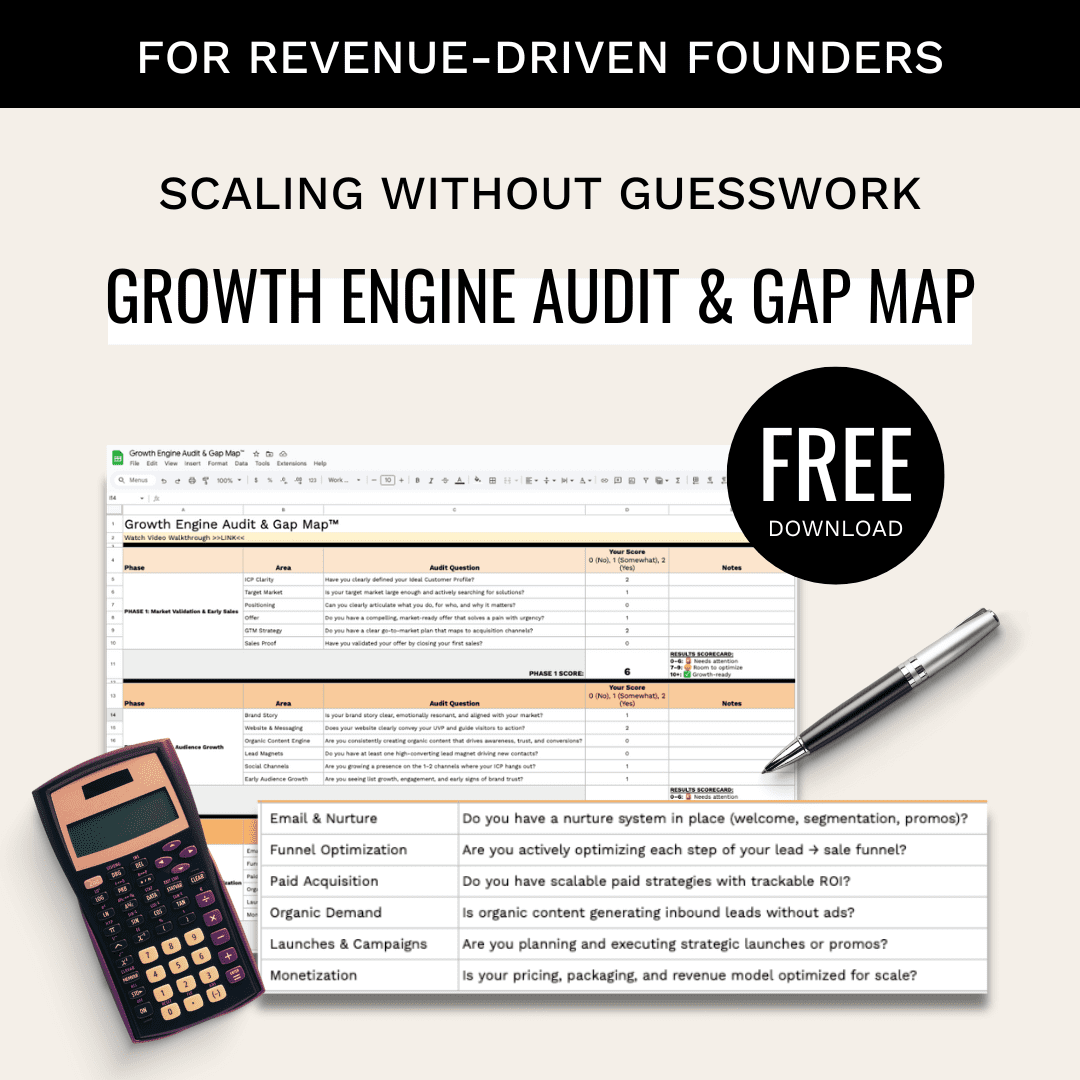Sound familiar? If so, you’re not alone.
Understanding the ins and outs of IT consultant rates is crucial to ensure you’re not selling yourself short. That’s why I’m writing this blog post. We’ll delve into the intricacies of determining competitive consulting fees and provide you with the strategies you need to command top-tier pricing and grow your consulting business effectively.
We’ll start by exploring the broad scope of consulting before identifying the common mistakes that could be holding you back from earning what you’re worth. Of course, negotiating your rates is a critical part of the process. And, I’ll provide you with the tools you need to strike a balance between fair compensation and maintaining positive client relationships.
It doesn’t matter if you’re a seasoned IT consultant or just getting started, this blog post provides you with the insights and strategies you need to succeed.
Let’s get started!…

Looking for something specific? Scroll straight to what you're looking for by clicking a link below:
Looking to build and grow a profitable startup from scratch? Don’t miss out on our free 75-minute masterclass that shows you how to 10x your revenue in the tech startup industry.
You’ll gain valuable insights on repackaging your data and technology expertise to take your IT consulting business to the next level. Claim your spot now, there are only 100 seats available!
The “Consulting” Umbrella
As a tech specialist, you might be wondering what advisory services you can offer clients.
Well, the IT consulting industry in the USA was worth a staggering $623 billion in 2022.

It’s a rapidly growing field that offers immense opportunities for professionals like you.
Consulting covers a wide range of areas and usually falls into one of five main categories:
- Strategy consulting,
- Operations consulting,
- Financial consulting,
- Information technology (IT) consulting and
- Human resources (HR) consulting.
As an experienced professional, you have the chance to tap into this thriving industry and carve out your niche.
By understanding the specific demands and trends within the IT consulting sector, you can position yourself to stand out from the competition. There’s plenty of room for growth no matter what your specialty is.
It’s okay to explore different consulting areas and find what works best for you and your clients.
Segmentation by Industry
Every industry in the IT consulting world has its own technology needs and challenges. Providing the best possible solutions to your clients requires recognition and understanding of their unique needs.
For example, healthcare companies find dealing with health a real challenge (one you can fix). Whereas a retail business might benefit from an e-commerce solution.
That’s why specializing in a specific industry vertical, like finance or manufacturing, can be a smart move. By focusing on a particular field, you can offer clients customized solutions that address their specific pain points and needs. This is what makes you stand out as an expert in your niche.
Other segmentation examples include:
- Cloud Computing: As more businesses migrate their infrastructure to the cloud, consultants with expertise in cloud computing platforms like AWS or Azure are highly sought after.
- Data Analytics: Companies need help making sense of their data; enter data analytics consultants who specialize in turning raw numbers into actionable insights.
- Cybersecurity: With cyber threats on the rise, organizations require skilled professionals to safeguard their digital assets from potential breaches.
Consultant vs Freelancer - What's the Difference?
Consultants and freelancers both play important roles in the business world. Freelancers are typically hired to complete specific tasks, such as building a website or developing a software application, while consultants are brought on for strategic guidance.
Successful consultants possess a wide range of skills and expertise. The ability to think critically and provide customized business solutions is key. Strong communication and relationship-building skills are also essential.
That’s why strategic consultants are often able to charge more than implementation workers. The work they deliver has the potential to drive higher ROI for the client, making it a valuable investment.
Editor’s Note: Strategic consultants are generally able to charge at least 2x more than implementation workers because the type of work they deliver often leads to much higher ROI than task-level work.
Common Consulting Mistakes That Lead to Low IT Consultant Rates
We all make mistakes. But, there are a few common ones I see all the time that can seriously impact your financial success!…
Underpricing Your Services
As a newbie in the IT consulting world, it can be tempting to lowball your rates to attract more clients. Tread with caution when considering this approach as it may have negative consequences that could harm your business in the future.
To avoid undervaluing your worth, start by doing some research on what similar IT consultants charge for their services. By knowing the market standards, you can set your prices accordingly.
But don’t stop at the numbers! Think about the value you provide to your clients. Businesses can thrive with your unique IT skills and expertise, and people are willing to pay a premium for that kind of knowledge!
Failing to Account for Personal Expenses
As an independent information technology consultant, it’s easy to overlook the personal expenses that come with being your own boss. But overlooking these costs can lead to major shortfalls in your income.
When setting your IT consultant rates, you need to take into account things like taxes, health insurance premiums, and retirement savings (the things you don’t think about because they’re usually taken straight out of your salary in corporate).
If you take a holistic view of your finances, you can set rates that cover your expenses while allowing you to maintain a comfortable lifestyle and build a thriving consulting business.

Lack of Clear Value Propositions
Making sure clients understand the value you bring is one of your biggest challenges as an information technology consultant. If you rely on generic value propositions like “great customer service,” you may have trouble standing out in a crowded field.
The key is to identify what makes you truly unique and focus on that. Do you have specialized skills in cloud computing or expertise in software development?
Whatever your secret sauce is, make sure you’re communicating those strengths clearly to potential clients. By highlighting your specific areas of expertise, you can differentiate yourself from the competition and justify charging higher rates for your consulting services.
Not Offering Flexible Pricing Options
If you want to attract those big fish clients, you need to be open to different payment structures. Being flexible with your pricing options can give you an edge and appeal to a wider range of clients with varying needs and preferences.
Not being flexible with your pricing can limit your ability to attract clients who have different budget constraints and project requirements.
Some clients may want a predictable monthly fee arrangement that gives them budget predictability, while others may prefer hourly or per-project rates that provide more flexibility.
Having more pricing options allows you to cater to clients with a wide range of needs.
Weak Marketing Efforts
Finding new clients can be a real challenge. Without adequate marketing efforts, potential clients may not even know about your services or may not perceive them as valuable.
It may seem like a lot of work, but trust me… investing some time and effort into building an online presence and increasing your visibility pay’s off tenfold!
Social media platforms like LinkedIn and industry-specific forums can be excellent channels for reaching new clients and demonstrating your expertise. Attending networking events is also a good way to establish yourself as a leader and connect with potential clients.
Avoiding these common mistakes will set you on the path toward earning top-tier IT consultant rates while ensuring long-term success for your business endeavors. Expenses can quickly mount when consulting is done incorrectly, so it’s important to be aware of the elements that could lead to a lower rate and make sure your project succeeds.
As we continue into 2023, IT consultant rates are likely to change as technology advances and market conditions shift; thus, it is critical for tech startup founders and leaders to stay informed of current trends in the industry.
Editor’s Note: As an experienced IT consultant, it’s important to price your services accurately and offer flexible payment options. Additionally, marketing yourself effectively can be key in securing lucrative contracts that bring in top-tier rates. To hit the ground running and maximize profits, avoid common pitfalls such as underpricing or failing to account for personal expenses.
IT Consultant Rates 2023
You’re a tech specialist, so I don’t need to tell you how fast-paced the industry is! With new technologies and advancements emerging every day, it can be tricky to keep up with the constantly evolving IT consulting rates.
And that’s not all! Things like your experience level, the industry you serve, and even where you live can affect the rates you charge.
So, to give you a little head start with the latest trends, I’ve put together some baseline figures for IT consultant rates in 2023.
Baseline IT Consultant Rates
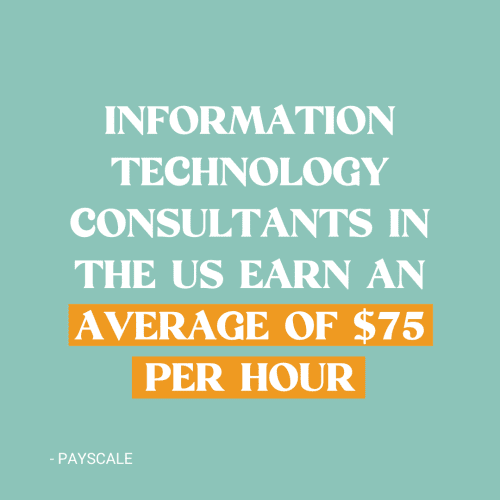
Information Technology Consultants in the US earn an average of $75 per hour. That’s not too shabby!
If you have some specialist skills under your belt, you can charge up to $350 per hour or even more.
- Entry-level IT consultant rates: $50-$75 per hour
- Moderately experienced IT consultant rates: $100-$150 per hour
- Highly experienced/specialized IT consultant rates: $200-$350+ per hour
Real Life IT Consultant Rate Examples
To help give you an idea of what IT consultant rates can look like in real life, I’ve compiled some rate examples across various IT consulting specialties. These examples will help you understand the range of rates in the industry and assist you in determining your own pricing strategy.
- PricewaterhouseCoopers Management Consulting Rate Card. The rate card offers insights into the pricing structure of PwC’s consulting services, including hourly rates for various job roles and experience levels.
- SFIA Rate Card

- @EdConwaySky sharing some insight on Deloittes day rate table.

The above examples are just a reference point. They should be considered alongside other factors such as your expertise, experience, location, and what you are offering.
Also keep in mind that IT consulting rates can evolve over time, so regularly reassessing and adjusting your rates based on market trends and your professional growth is crucial.
Baseline IT Consultant Rates by Industry
Different industries may have different expectations when it comes to consulting fees. Here are some ballpark figures for various sectors within tech:
- Data Analytics & Business Intelligence: $100-$250/hour (source: CIO Magazine)
- Cybersecurity: $120-$300/hour (source: Indeed)
- Cloud Computing: $100-$250/hour (source: Forbes)
- Software Development: $75-$200/hour (source: Codementor)
These figures are just a starting point. Rates vary massively depending on experience and the complexity of the project. And if you’re just starting out in the consulting game, you may need to charge lower fees initially to build your reputation and get some projects under your belt.
In time, you can easily raise your rates as you gain experience and build a portfolio, attracting larger clients. Rather than getting hung up on these ballpark figures, focus on delivering high-quality work and building strong relationships with your clients. The rest will fall into place.
"Set your #ITConsulting rates competitively in 2023 with our baseline figures. Expertise, complexity & local market conditions all affect the rate you can charge - get the full breakdown here." #GrowthMarketing #TechStartups
An Information Technology Consultant's Guide to Selling IT Consulting Services at Top-Tier Rates
As an independent tech consultant, you have a ton of knowledge to share. But you need to be smart about how you sell your services if you want to earn the rates you deserve.
That’s where the 4 P’s marketing mix approach comes in.
This strategy includes;
- People (aka your customers),
- Product (the services you offer and how you package them),
- Placement (where and how you promote your services), and
- Pricing (how much you charge for your services)
Here’s how (I’ve also thrown in a bonus P to the mix)…
People (Customers)
The quickest way to get booked out is by selling a solution to people’s problems. To do that, you need to know EXACTLY who you’re ideal client is. And I mean every little detail!
Let’s say you’re an expert software developer for example. You might want to focus on helping tech startup founders or business leaders who are looking to develop customized software solutions to grow their businesses.
Think about their needs, pain points, expectations, and how your solution solves those problems.
By understanding their needs and expectations, you can tailor your offerings accordingly.
Product (in this case, “Service Packaging”)
Your services are your product (products aren’t always physical objects). And when it comes to service packaging is all about how you package and present your consulting services to clients. Rather than just listing off what you offer, it’s about howcasing the value and benefits you bring to the table.
Here’s an example…
Let’s say you’re an expert in Google Analytics consulting. Your service package would highlight how your skills can help clients gain a deep understanding of their website traffic, supercharge their marketing campaigns, and ultimately boost their revenue. It’s about showing clients the real impact you can make.
When you package your services in a clear and compelling way, you can stand out from the crowd and show that your expertise is worth the investment. Your job is to convince potential clients that you provide value and why they should choose you over your competitors.
So, when you create your service descriptions, make sure to focus on the specific benefits you bring and how you can solve your clients’ problems. This will help you justify charging higher fees for your consulting services and position yourself as a trusted and valuable partner in their business growth.
Here’s an example of one how one my previous students, Marybeth Maskovas has broken out her GA consulting packages…
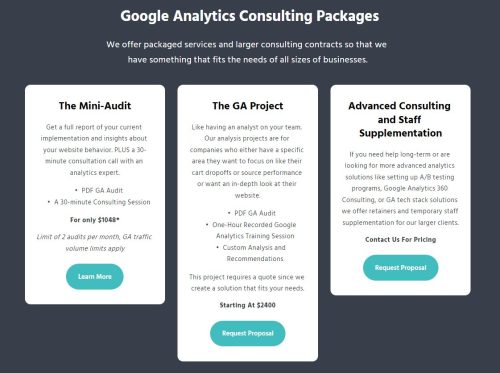

Case studies are another powerful way to showcase the tangible results you’ve achieved for previous clients. By highlighting successful projects and the outcomes you helped clients achieve, you can build credibility and demonstrate your ability to deliver value. For instance, you might showcase how you helped a client increase their website traffic by 50% or how you improved their conversion rates through data-driven insights.
Finally, maintaining a strong online presence is crucial to attracting potential clients. By sharing thought leadership content that demonstrates your expertise and relevance to potential clients, you can build a following and establish yourself as an authority in your field. This might include publishing blog posts or sharing insights on social media that offer valuable insights into the latest trends and best practices in your industry.
Placement
When it comes to finding opportunities for high-paying consulting gigs, placement is crucial. If you’re just starting out, you need to be strategic and deliberate about your networking.
Consider joining local meetups or industry events related to technology startups to build your client base. Online forums and LinkedIn groups can also help you connect with potential clients.
However, poor placement can lead to missed opportunities, stagnant growth, and even failure. As a result, you could end up wasting time and resources on clients who aren’t a good fit.
Take a look at Ryan C’s Upwork profile below. With his experience, there’s no wonder he’s in the top 1% on Upwork charging only $150. He could easily be charging 10x that rate if he positioned himself better (i.e., not relying solely on freelancing sites).
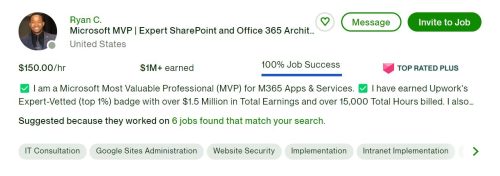
To maximize your chances of securing top-tier rates and breaki free from relying solely on freelancer job platforms, it’s crucial to have a deep understanding of your target audience.
Take the time to identify where they spend their time both online and offline. This could include industry-specific forums, social media groups, networking events, and even local meetups.
By immersing yourself in these communities and engaging with potential clients, you can build valuable relationships and establish yourself as an expert in your niche. When clients see you as a trusted authority in your field, they’ll be more likely to hire you and pay premium rates for your services.
As a starting point, I have divided my networking recommendations into categories based on the stage you’re at in your consulting journey…
Entry level:
If you’re just starting out in consulting, it’s a good idea to join local meetups or industry events focused on technology startups.
These gatherings are awesome for newer consultants to meet potential clients, get leads, and even receive referrals. Building your client base is key at this stage, and these meetups are a great starting point.
Experienced consultant:
For experienced consultants who have been in the game for a while, you might want to consider partnering with specialized platforms like Consultport.
These platforms connect seasoned professionals with top-notch projects that require specific expertise. It’s an excellent way to find high-quality projects and expand your professional network.
All consultants:
No matter where you are in your consulting journey, it’s important to actively participate in online forums, LinkedIn groups, and other communities where tech startup founders and leaders hang out.
Engage in discussions, share your insights, and offer valuable advice on relevant topics. By showcasing your expertise and being a helpful presence in these communities, you can establish yourself as a trusted consultant and attract potential clients.
Pricing
Figuring out how to price your services is NEVER easy! So, here are a few different strategies you can try depending on your experience…
Entry-level consultants method:
As a new data freelancer, there are two main ways to price your services: competitive analysis and employment rate equivalency.
First off, you can scope out what other data analytics consultants are charging for their services on platforms like Upwork. It’s important to filter your search by location and experience level to get a better idea of what your competition is charging.
However, keep in mind that IT consultant rates on these sites vary drastically, and there are many people undervaluing their services.
Another method is using the employment rate equivalency, which involves taking twice the hourly rate of what someone would make as an employee in a similar position and using that as a baseline for your consulting rate.
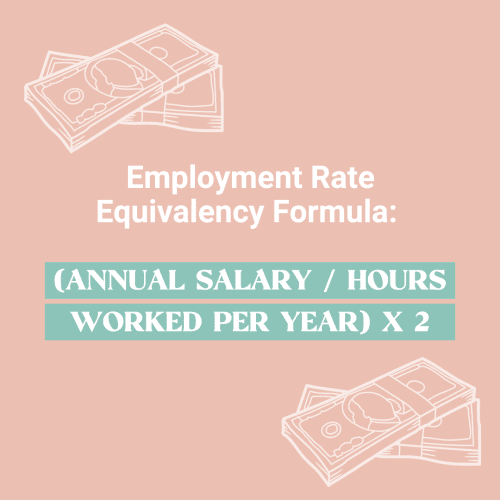
In the beginning, I’d recommend charging a little bit less than the average rate and letting potential clients know that your rates reflect your level of experience. As your experience grows, your rates do too!
Want to know how you can quickly double your IT consultant rate? Watch this video…
Experienced Consultant’s Method; Pricing At >$350/hour:
There is a common misconception that experienced IT consultants charge more for their services, but that is not always the case. The truth is that many freelancers undervalue their worth, resulting in missed opportunities for higher earnings.
So, how can you avoid this and start earning what you deserve? Here are three tips to help you increase your IT consultant rates and bring in more revenue:
- Sell Deliverables, Not Time: Instead of charging by the hour, try selling deliverables. This means providing clients with a specific outcome or result for a set price, rather than billing them for the time it takes to complete a project. Besides allowing you to charge more for your expertise, it also helps clients understand the value you provide.
- Sell Your Offers in Packages: Another way to increase your earnings is by selling your services in packages. Combining your services increases the value proposition of your offer and makes it more attractive to clients.
- Create a Standard Offer: A standard offer should include all the deliverables, bonuses, and price points you typically offer clients. It will serve as a starting point for negotiations and provide a baseline for your services.
Check the video below where I’m sharing even MORE insights on how you can start charging $300+ per hour!
BONUS P: Promotion
Promoting your IT consulting services can be challenging, but it’s essential for attracting the right clients and earning top-tier rates. You need to showcase your skills, knowledge, and expertise to potential clients, and there are plenty of channels to do it…
Social media platforms like LinkedIn or Twitter are excellent places to engage with other professionals and share valuable content that showcases your expertise. Guest blogging on reputable websites in the tech startup space can also help establish you as an expert in your field.
Webinars are another great way to build your personal brand and establish credibility as an IT consultant. Share your expertise and knowledge in a public forum to demonstrate your value to potential clients.
Remember, personal branding is essential for establishing credibility and attracting high-paying clients. If you establish yourself as a thought leader in your niche, you can command top rates for your services and stand out from the competition.
Editor’s Note: As an experienced IT consultant, you need to position yourself as a top-tier professional in order to command premium rates. To do this effectively, consider the 4 P’s marketing mix: People (Customers), Product (Service Packaging), Placement, and Pricing; while also promoting yourself through personal branding on social media and guest blogging opportunities.
Offer Discounts for Long-Term Projects
Building long-term relationships with clients and securing long-term projects are key for successful consultants. Offering discounts for long-term commitments can be a great way to do this. Not only will you maintain a steady income stream, but you’ll also encourage clients to stick around and keep doing business with you.
For example, you could offer a discount to clients who sign up for a 6-month contract. You get the time you need to make a real impact in their business, and they have the incentive to work with you long-term.
A Win-Win Situation
Offering a discount can sometimes feel like you’re giving away hard-earned cash. But believe it or not, it can actually be a win-win for both you and your client.
Let me break it down for you:
Firstly, a discount means more value for your client’s investment, and who doesn’t love that? By offering a lower rate, you’re providing them with top-notch tech consulting services at a reduced cost. This not only strengthens your client relationships but also helps them achieve their goals while keeping their budgets in check.
Now, let’s talk about the wins for you as the consultant.
Offering a discount can secure you a steady stream of work and income. Imagine locking in a client for an extended period of time with a discounted rate for ongoing support services. This creates a win-win situation where you have a guaranteed income flow without constantly chasing new projects.
But it doesn’t stop there. By providing a discounted rate, you’re building a solid foundation for long-term relationships with your clients. They appreciate the cost savings you’re offering and are more likely to stick with you for future projects.
Plus, satisfied clients are often eager to refer your services to others in need of tech consulting expertise. These referrals can be a game-changer, bringing you new opportunities and higher-paying projects down the line.
So, don’t shy away from offering a discount. It’s a strategic move that benefits your clients by giving them more value, while also setting you up for financial stability, long-term relationships, and potential referrals.
Tailoring Your Discount Strategy
Providing discounts to potential clients requires a strategic approach. You the discount to be big enough to entice long-term clients, but not too big that it comprises your profitability.
Here are some things to consider when tailoring your discount strategy:
- Potential Clients: Identify potential clients who have ongoing or recurring needs in areas such as software development, cloud computing, or other IT services where your expertise lies.
- Budget Constraints: Understand the budget constraints of these potential clients and tailor your discount offers accordingly so that they find value in committing to long-term engagements with you.
- Type of Project: Consider offering higher discounts on larger projects or those requiring specialized skills which can justify higher hourly rates even after applying the discount.
Milestone-Based Discounts: Create milestone-based incentives wherein additional discounts are offered upon reaching certain project milestones; this ensures that the client remains engaged and committed to the project’s success.
Communicating Your Discount Offers Effectively
Let’s get real here. Offering discounts to potential clients is not about throwing numbers around and hoping they’ll bite. It’s about ensuring that they fully grasp the incredible value they’re receiving and how it can transform their business.
Listen up: it’s not just about the money they’ll save (although that’s definitely a nice bonus!). It’s about the deeper impact of long-term collaboration.
When you commit to working together for an extended period, you create an opportunity to truly understand their business, become their trusted advisor, and drive their success.
So, when you communicate your discount offers, go beyond the dollars and cents. Shine a light on the broader benefits of long-term collaboration – the seamless teamwork, the open lines of communication, and the deep understanding of their unique business needs. Paint a vivid picture of how your unwavering support will make their lives easier and their goals more attainable.
Editor’s Note: By offering discounts on long-term projects, IT consultants can benefit from increased cash flow and build lasting relationships with clients. This win-win situation requires tailoring the discount strategy based on potential client needs and budget constraints, as well as communicating it effectively in order to sweeten the deal.
Negotiate Your Rates Wisely
Negotiation is a real skill. You don’t want to scare off potential clients, but you don’t want to leave money on the table either.
Here are 5 tips on how to negotiate your IT consulting rates wisely:
1. Understand Your Client’s Budget Constraints
Knowing your client’s budget constraints is essential before you start negotiating. There’s no point wasting your time on calls or creating proposals if you’re not even in the same ballpark!
If there’s some wiggle room on budget, you can tweak your proposal to match. You can add or remove additional services/products to fit. It’s all about finding that sweet spot where both parties benefit and can achieve their goals.
2. Demonstrate Your Value Proposition
If you want to charge higher consulting fees, you need to show your clients why you’re worth the extra bucks. That means highlighting your expertise in cloud computing, software development, or whatever other relevant fields you specialize in. You can do this by…
- Showcasing certifications and specialized training related to their project needs.
- Providing testimonials from satisfied clients who have benefited from working with you.
- Offering insights into potential cost savings or revenue generation opportunities they may not have considered without your guidance.
3. Benchmark Against Industry Averages
When it comes to setting your IT consulting rates, it’s always a good idea to do your homework and research industry averages. This means checking out what other IT consultants with similar experience and expertise are charging for their services.
I’ve given some information on IT consultant rates in this blog, but websites like Glassdoor, Payscale, and BLS can also be excellent resources for getting a sense of the current market. Taking the time to compare your rates with those of other consultants in your field helps you remain competitive while charging a fair price.
4. Create Flexible Pricing Options
To appeal to a wider range of clients and increase your chances of securing new projects, consider adopting a more flexible pricing strategy. One client might prefer to pay hourly rates, while another may prefer to pay a fixed fee per project or a monthly retainer.
Giving clients more options can make them feel more comfortable and confident in choosing your services. This approach also allows you to tailor your pricing to different budgets and requirements while still getting paid fairly for your skills and knowledge.
Try out different pricing models and see what works best for you.
5. Don't Be Afraid To Walk Away
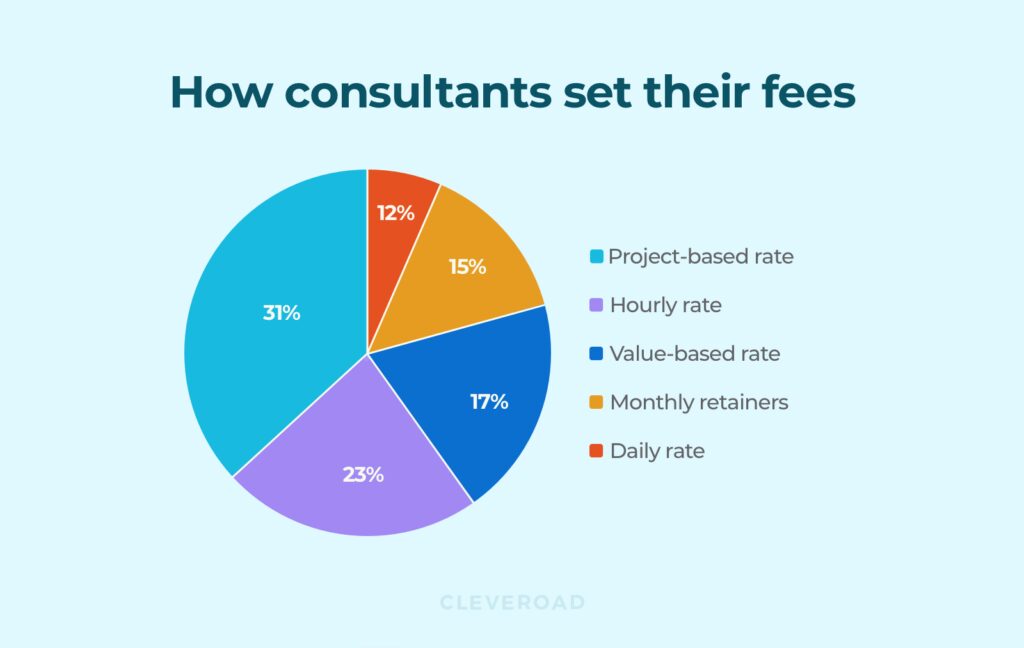
Your field and your skills are valuable. Even though it’s tempting to take on a project at a lower rate, you should not undervalue your skills.
If a potential client can’t meet your minimum rate, walk away. Initially, this might seem daunting, but in the long run, it will help you establish a reputation as an experienced and respected consultant.
When it comes to negotiating your IT consulting rates, it’s important to be confident in your worth and know your value. Negotiation is a two-way street, so be open to compromise while still standing firm on what you believe is fair
You can use the strategies we’ve discussed in this article, such as researching industry rates and leveraging your unique expertise and experience, to negotiate for top-tier compensation.
Editor’s Note: As an advanced IT consultant, it’s important to understand your worth and negotiate accordingly. To ensure you’re fairly compensated for your expertise, demonstrate the value of your services by highlighting past successes and industry-standard rates. Fear not to depart from discussions if a stalemate is reached – it will be beneficial in the end.
Frequently Asked Questions IT Consultant Rates
What are standard IT consulting rates?
Standard IT consultant rates vary based on factors such as experience, location, and project complexity. On average, they range from $50 to $200 per hour for entry-level consultants and can go up to $300 or more for highly experienced professionals. It’s essential to research market trends and adjust your rates accordingly.
What is the US hourly rate for an IT consultant?
In the United States, hourly rates for IT consultants typically range between $75 to over $250 per hour depending on their experience level and specialization area. For example, cybersecurity experts may charge higher fees than generalists due to increased demand in that field. Keep in mind that regional differences also affect pricing.
What is the market size for IT consultants?
The global market size of IT consultancy services has been valued at approximately $65.36 billion in 2023 with steady growth projected through 2026 driven by increasing digital transformation initiatives worldwide. The United States represents one of the largest markets within this sector due to its strong technology ecosystem.
Final Thoughts
And there you have it, everything you need to know to set competitive IT consultant rates and establish yourself as a successful IT consultant. From understanding your market and target audience to creating value-added service packages, each step plays a crucial role in your success.
Remember, as an IT consultant, your knowledge and expertise are your most valuable assets, and it’s up to you to showcase your value proposition and negotiate effectively to secure top-tier compensation. Stay informed about industry trends and continually adapt to market conditions to maximize your earning potential.
If you’re ready to take your IT consulting business to the next level, sign up for my FREE masterclass today. In the masterclass, you’ll learn how to successfully repackage your data and technology expertise and skyrocket your startup revenues. Don’t wait too long, seats for the masterclass are limited, so claim your spot now!







